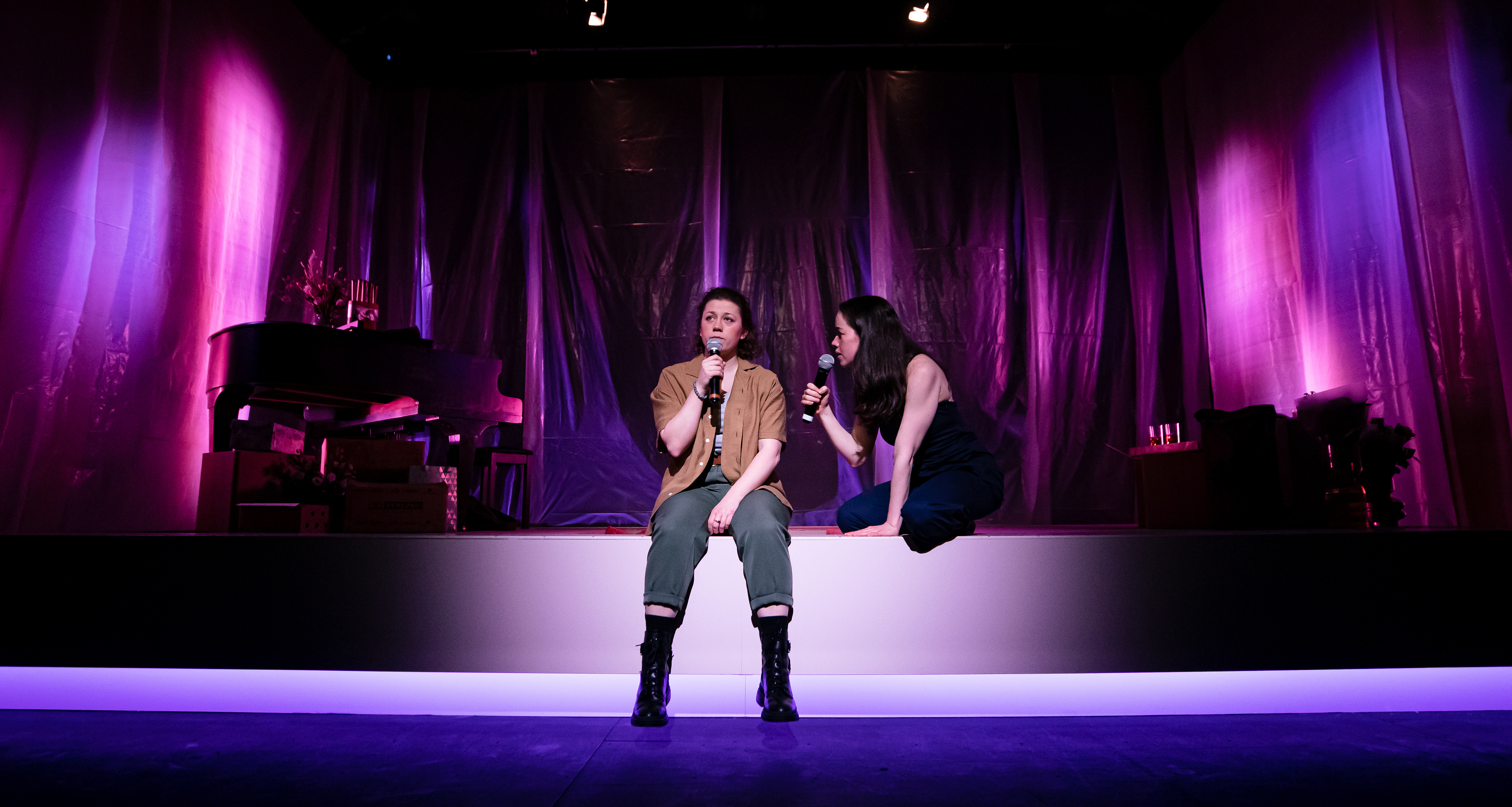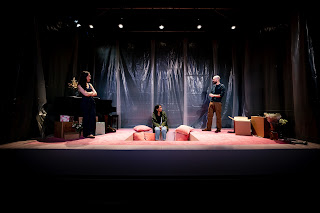
Reading Rep is celebrating its tenth anniversary of its formation and a second season in its new venue with some bold and original adaptations of familiar stories. After the glorious success of a one-woman version of Jekyll and Hyde with the incredible Audrey Brisson and an intriguing resetting of Christmas Carol in the Huntley and Palmer Reading Biscuit factory comes a modern adaptation of Hedda Gabler set somewhere near London. This risk-taking approach to theatre combined with a £10 ticket price for those under 30 appears to be engaging the local communities and bringing a younger excitable audience into the venue which is to be celebrated and applauded.
The original Henrik Ibsen’s Hedda Gabler was written in 1891 around a woman trapped in a marriage and a house that she does not want and has been considered by many as one of the great dramatic female roles in theatre. When I saw Sheridan Smith play the role at Old Vic in 2012, she beautifully captured the tragic consequences of her manipulative behaviour in a grand period house. This new production at the Reading Rep intimate venue is written by Harriet Madeley and seeks to reinvent the story in a modern setting with the two rival academic authors competing for publication as well as the attention of Hedda now given a modern twist by changing the gender of Eilert Lovburg, her former lover to Isla. The rest follows with the three women, Isla, Thea and Hedda secretly attracted to each other, seemingly without the men, George, her husband, and Brack, now a publishing agent being fully aware. Curiously the effect is that rather than feeling Hedda is trapped in a six-week-old marriage, she seems manipulative and in control of her actions and one wonders why she simply does not leave her husband whose mind is clearly on his work. Indeed, the characters have become one-dimensional and their jumps in behaviours seem unrealistic and unbelievable.
 It is not helped by the curious setting, designed by Amy Watts, in which the dilapidated old house is depicted with walls made of discoloured plastic sheets around a living room with a ludicrous fire pit in the centre of the room. As a result, the cast are called upon to step in and out of the pit throughout or carefully walk around its edges. Perhaps there was some symbolic meaning to when they stood in the pit, sat on the edge, or stepped up to floor level but I missed it, and it proved a massive distraction. Is Hedda meant to be drawing people into the destructive power of the flames? Equally, Director Annie Kershaw's decision to stage three intimate interviews on the forestage using hand microphones adds to the lack of realism as if the conversations are imagined or are flashbacks and lessens the dramatic impact despite the revelations. Another of Ibsen’s characters, Aunt Julie, is seen only in silhouette through the plastic while speaking through her smartphone to George which proves a rather dull dramatic device. Some of the audience clearly saw this differently as there was the occasional loud hysterical laughter in reaction to some of this which had the effect of dissipating any tension in the relationships on stage.
It is not helped by the curious setting, designed by Amy Watts, in which the dilapidated old house is depicted with walls made of discoloured plastic sheets around a living room with a ludicrous fire pit in the centre of the room. As a result, the cast are called upon to step in and out of the pit throughout or carefully walk around its edges. Perhaps there was some symbolic meaning to when they stood in the pit, sat on the edge, or stepped up to floor level but I missed it, and it proved a massive distraction. Is Hedda meant to be drawing people into the destructive power of the flames? Equally, Director Annie Kershaw's decision to stage three intimate interviews on the forestage using hand microphones adds to the lack of realism as if the conversations are imagined or are flashbacks and lessens the dramatic impact despite the revelations. Another of Ibsen’s characters, Aunt Julie, is seen only in silhouette through the plastic while speaking through her smartphone to George which proves a rather dull dramatic device. Some of the audience clearly saw this differently as there was the occasional loud hysterical laughter in reaction to some of this which had the effect of dissipating any tension in the relationships on stage.The cast of five has to work very hard to create any dramatic tension in this setting and only occasionally do the characters connect in a way that seems believable and reveals insight into their feelings. Anna Popplewell makes her stage debut as Hedda Gabler and conveys the boredom she feels near her husband and displays cruel bitchy and unpleasant manipulative thoughts but never reveals any passion or desire towards any of the other characters. Jessica Temple as Isla fares better and conveys her struggle to control her alcoholism, her self-doubt, and her hidden passions well although does seem too ready to be influenced by Hedda. Mark Desebrock as George, Ryan Gerald as the controlling Brack and Natalie Perera as Thea are called on to reveal awkward tension in their relationships but suffer from the staging and lack of realism.
 The programme highlights the creative team's desire to show LGBTQIA+ people as glorious beings and to explain Hedda’s dissatisfaction with her heterosexual marriage. It presents George as an obsessive researcher and author who is more interested in his next manuscript than his wife and Brack as a manipulative and controlling force, but this fails to make us see Hedda as a victim or explain why this should cause Isla to behave as she does. Both Hedda and Isla seem to be intelligent and strong people which makes their fate seems so out of place.
The programme highlights the creative team's desire to show LGBTQIA+ people as glorious beings and to explain Hedda’s dissatisfaction with her heterosexual marriage. It presents George as an obsessive researcher and author who is more interested in his next manuscript than his wife and Brack as a manipulative and controlling force, but this fails to make us see Hedda as a victim or explain why this should cause Isla to behave as she does. Both Hedda and Isla seem to be intelligent and strong people which makes their fate seems so out of place.Reading Rep is an exciting adventurous company which on limited budgets is attracting well-experienced performers and pushing the boundaries of traditional theatre and traditional theatre audiences in bold and innovative programming. There is a post-show talk on this latest production on 9th March which might offer some insight into this adaptation. Critical to its ongoing success is attracting sufficient audiences from both the new demographics and traditional theatregoers and part of that is for both groups to understand that what is exciting about live theatre is being challenged, amused and engaged in equal measure. We have to accept that you don’t always respond to every new innovation in the same way, but we should celebrate the adventurous programming, the work and risk-taking of performers and creatives and enjoy the experience of discovering live theatre and their efforts.
Review by Nick Wayne
Rating: ★★
Seat: Row D | Price of Ticket: £19.50
